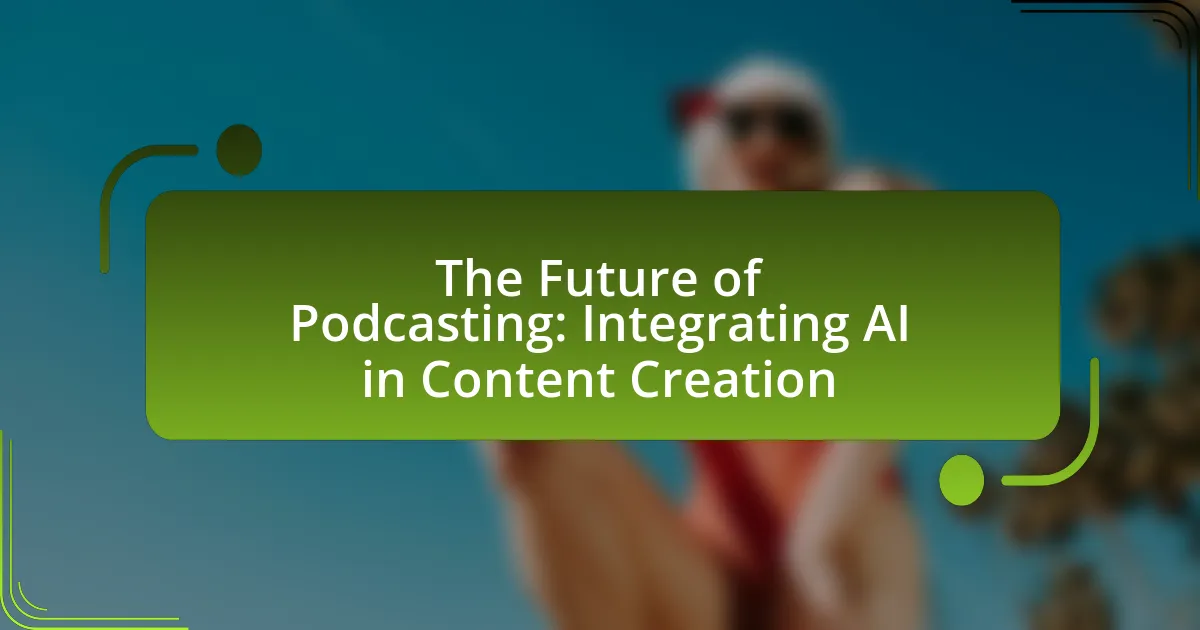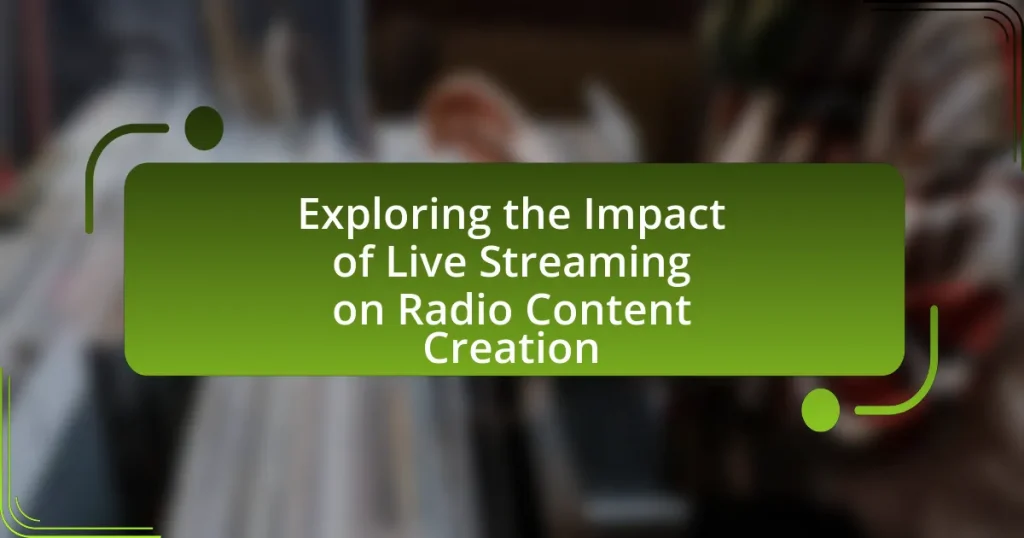The article focuses on the future of podcasting through the integration of artificial intelligence (AI) in content creation. It highlights how AI technologies, such as natural language processing and machine learning, enhance production efficiency, personalize listener experiences, and improve content creation processes. Key topics include the transformation of content creation, the specific AI technologies utilized, the benefits and challenges of AI integration, and the importance of data analytics in shaping podcast content. Additionally, the article discusses best practices for podcasters to balance AI use with human creativity and enhance audience engagement.
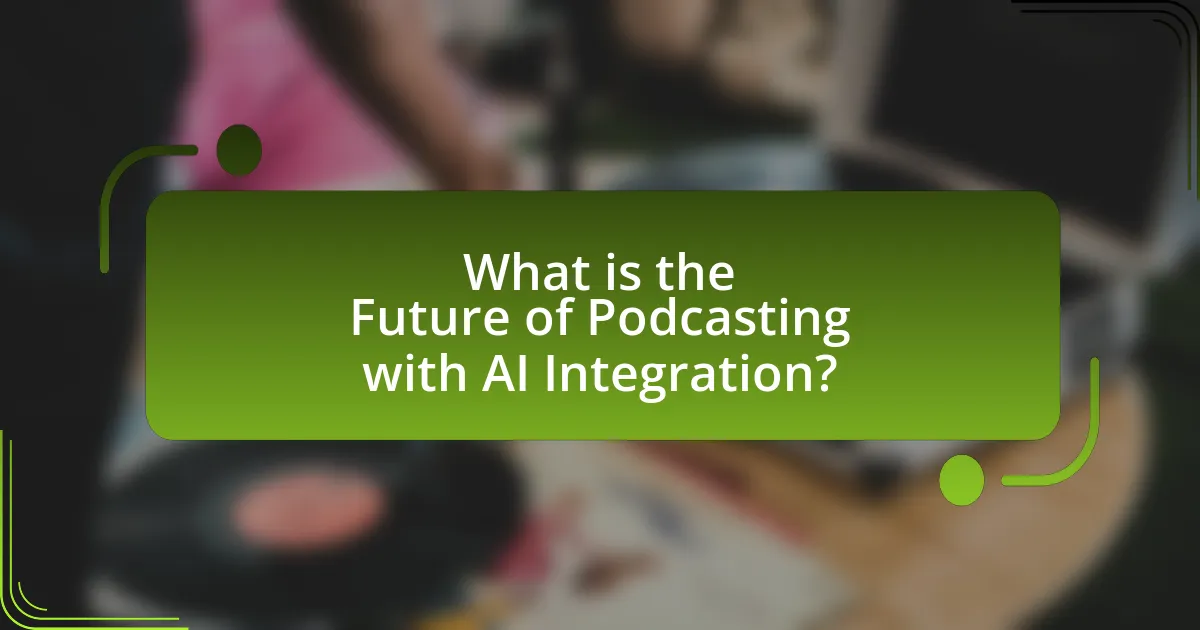
What is the Future of Podcasting with AI Integration?
The future of podcasting with AI integration is characterized by enhanced content creation, personalized listener experiences, and improved production efficiency. AI technologies, such as natural language processing and machine learning, enable podcasters to automate editing, generate transcripts, and create tailored recommendations based on listener preferences. For instance, tools like Descript and Auphonic utilize AI to streamline audio editing and enhance sound quality, significantly reducing production time. Additionally, AI-driven analytics can provide insights into audience engagement, allowing creators to refine their content strategy effectively. As of 2023, the podcasting industry is projected to grow to over $4 billion in revenue, indicating a strong demand for innovative solutions that AI can provide.
How is AI transforming content creation in podcasting?
AI is transforming content creation in podcasting by automating various aspects of production, enhancing personalization, and improving audience engagement. For instance, AI tools can generate scripts, edit audio, and even create voiceovers, significantly reducing the time and effort required for content creation. According to a report by PwC, the use of AI in media and entertainment is expected to grow, with AI-driven tools enabling podcasters to analyze listener preferences and tailor content accordingly. This data-driven approach allows creators to produce more relevant and engaging episodes, ultimately leading to increased listener retention and satisfaction.
What specific AI technologies are being utilized in podcasting?
AI technologies utilized in podcasting include natural language processing (NLP), machine learning algorithms, and voice synthesis. NLP is employed for transcribing audio content into text, enabling easier searchability and accessibility. Machine learning algorithms analyze listener preferences and behaviors to recommend content and optimize marketing strategies. Voice synthesis technology generates realistic voiceovers, allowing for automated narration and enhanced production efficiency. These technologies collectively enhance content creation, distribution, and audience engagement in the podcasting landscape.
How do these technologies enhance the podcasting experience?
Technologies such as AI and machine learning enhance the podcasting experience by improving content creation, personalization, and audience engagement. AI-driven tools can analyze listener preferences and behaviors, allowing creators to tailor content that resonates with their audience, thus increasing listener retention. For example, platforms like Descript utilize AI for audio editing, enabling podcasters to produce high-quality content more efficiently. Additionally, AI algorithms can recommend episodes to users based on their listening history, fostering a more personalized experience that keeps audiences engaged. This integration of technology not only streamlines production but also enhances the overall listener experience by making content more relevant and accessible.
What are the potential benefits of integrating AI in podcasting?
Integrating AI in podcasting offers several potential benefits, including enhanced content personalization, improved production efficiency, and advanced analytics. AI algorithms can analyze listener preferences and behaviors, allowing creators to tailor content to specific audiences, thereby increasing engagement. Additionally, AI tools can automate editing processes, reducing the time and effort required for production. For instance, AI-driven software can automatically remove filler words and background noise, streamlining the workflow. Furthermore, AI can provide detailed analytics on listener demographics and engagement metrics, enabling podcasters to make data-driven decisions to optimize their content strategy. These benefits collectively contribute to a more efficient and targeted podcasting experience.
How can AI improve content personalization for listeners?
AI can improve content personalization for listeners by analyzing user behavior and preferences to deliver tailored audio experiences. By utilizing machine learning algorithms, AI can track listening habits, such as preferred genres, episode lengths, and engagement levels, allowing platforms to recommend content that aligns with individual tastes. For instance, Spotify employs AI-driven recommendation systems that analyze over 30 million tracks and user interactions to curate personalized playlists, enhancing user satisfaction and retention. This data-driven approach not only increases listener engagement but also fosters a deeper connection between the content and the audience, ultimately leading to a more enjoyable listening experience.
What efficiencies can AI bring to podcast production processes?
AI can significantly enhance podcast production processes by automating tasks such as audio editing, transcription, and content generation. For instance, AI-driven tools can analyze audio files to remove background noise and optimize sound quality, which reduces the time spent on manual editing. Additionally, AI can provide real-time transcription services, converting spoken content into text quickly and accurately, thereby streamlining the creation of show notes and enhancing accessibility. Furthermore, AI algorithms can assist in generating episode outlines or even scripts based on predefined topics, allowing creators to focus more on creative aspects rather than administrative tasks. These efficiencies not only save time but also improve the overall quality and consistency of podcast content.
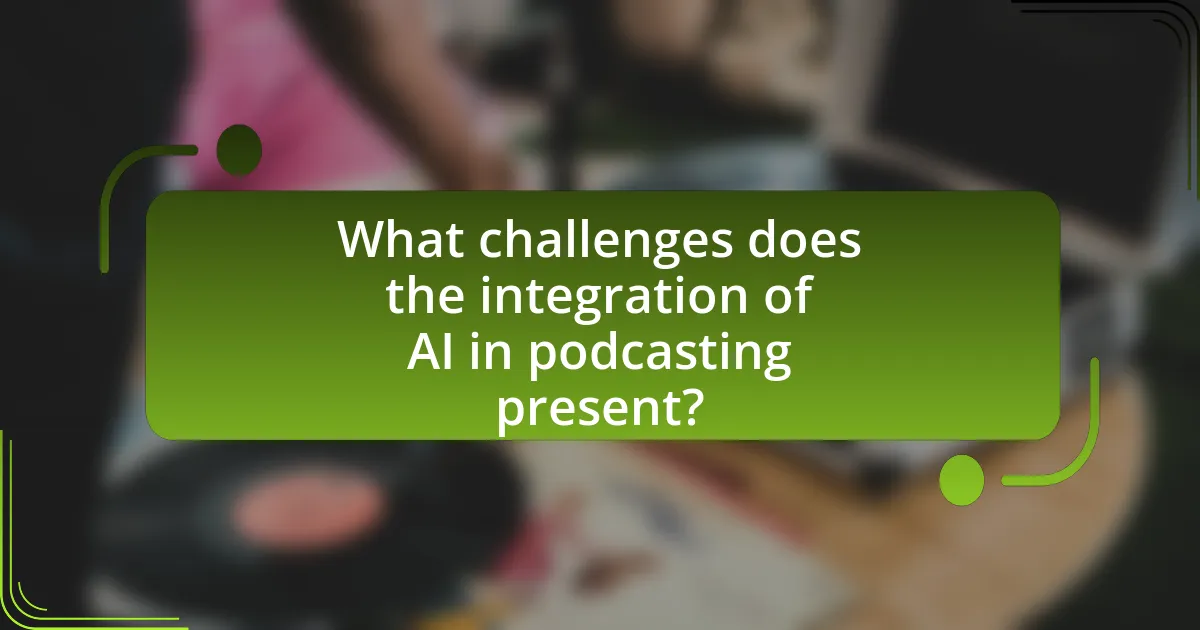
What challenges does the integration of AI in podcasting present?
The integration of AI in podcasting presents challenges such as content quality control, ethical concerns, and audience engagement. Content quality control is affected as AI-generated scripts may lack the nuance and creativity that human hosts provide, potentially leading to a decline in listener satisfaction. Ethical concerns arise from issues like copyright infringement and the potential for misinformation, as AI can inadvertently generate content that misrepresents facts or violates intellectual property rights. Additionally, maintaining audience engagement becomes difficult when AI-generated content lacks the personal touch and relatability that listeners often seek in podcasts. These challenges highlight the need for careful implementation and oversight in the use of AI technologies within the podcasting industry.
How can content creators address ethical concerns related to AI?
Content creators can address ethical concerns related to AI by implementing transparency in their use of AI technologies. This involves clearly disclosing when AI-generated content is utilized, ensuring audiences understand the role of AI in the creation process. For instance, a study by the Pew Research Center indicates that 72% of Americans believe transparency is crucial for ethical AI use. Additionally, creators should establish guidelines that prioritize fairness and avoid biases in AI algorithms, as biased AI can perpetuate stereotypes and misinformation. By actively engaging with their audience about the ethical implications of AI, creators can foster trust and accountability in their content.
What are the implications of AI-generated content on authenticity?
AI-generated content challenges authenticity by blurring the lines between human and machine-created material. This shift raises concerns about trust, as audiences may struggle to discern genuine voices from algorithmically produced content. A study by the Pew Research Center indicates that 64% of Americans believe that AI-generated content could lead to misinformation, further complicating perceptions of authenticity. Additionally, the ease of producing high volumes of content through AI can dilute the uniqueness and personal touch typically associated with authentic human expression, potentially leading to a homogenization of ideas and narratives in podcasting.
How can podcasters ensure quality control with AI tools?
Podcasters can ensure quality control with AI tools by utilizing automated editing software, which enhances audio clarity and removes background noise. These AI-driven tools analyze audio files for inconsistencies, allowing podcasters to maintain a professional sound quality. For instance, platforms like Descript and Auphonic use machine learning algorithms to optimize audio, ensuring that the final product meets industry standards. Additionally, AI can assist in transcribing episodes accurately, enabling podcasters to create show notes and improve accessibility, further enhancing the overall quality of the content.
What technical skills are necessary for podcasters to leverage AI?
Podcasters need skills in audio editing software, data analysis, and familiarity with AI tools to effectively leverage AI in their content creation. Proficiency in audio editing software, such as Adobe Audition or Audacity, allows podcasters to enhance sound quality and integrate AI-generated audio elements. Data analysis skills enable podcasters to interpret listener metrics and feedback, guiding content strategy and AI utilization. Additionally, understanding AI tools like transcription services, voice synthesis, and content recommendation algorithms empowers podcasters to streamline production and personalize listener experiences. These skills collectively enhance the quality and reach of podcast content in an increasingly AI-driven landscape.
What training resources are available for learning AI tools in podcasting?
Training resources for learning AI tools in podcasting include online courses, webinars, and tutorials specifically designed for podcasters. Platforms like Coursera and Udemy offer courses on AI applications in audio editing and content creation, while websites such as Podchaser and Podcast Insights provide articles and guides on integrating AI tools. Additionally, industry conferences often feature sessions on AI in podcasting, providing practical insights and networking opportunities. These resources are validated by the growing trend of AI adoption in the podcasting industry, as evidenced by a report from Edison Research indicating that 60% of podcasters are exploring AI technologies to enhance their production processes.
How can podcasters stay updated on AI advancements?
Podcasters can stay updated on AI advancements by subscribing to industry newsletters, attending webinars, and participating in online forums focused on AI in media. These resources provide timely information on the latest tools, trends, and research in AI technology relevant to podcasting. For instance, platforms like AI Weekly and the Podcast Movement offer insights and updates that can help podcasters integrate AI effectively into their content creation processes. Additionally, following key influencers and organizations in the AI space on social media can provide real-time updates and discussions on emerging technologies.
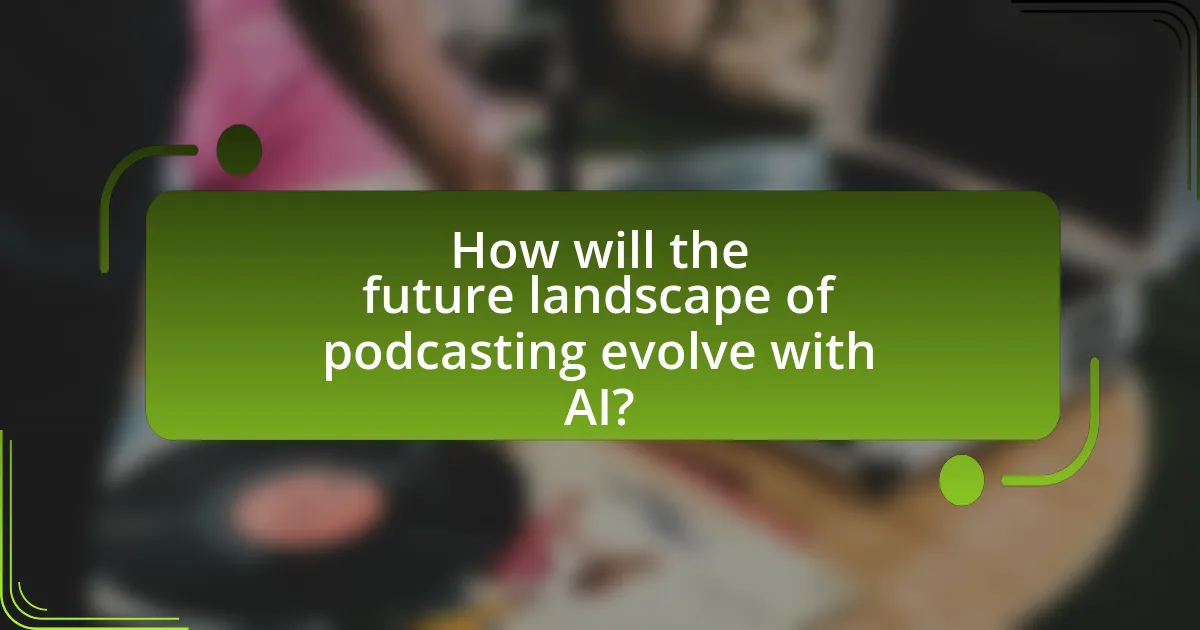
How will the future landscape of podcasting evolve with AI?
The future landscape of podcasting will evolve significantly with AI by enhancing content creation, personalization, and distribution. AI technologies will enable creators to automate editing processes, generate transcripts, and even create audio content using text-to-speech capabilities, thereby streamlining production. For instance, tools like Descript and Otter.ai already utilize AI for transcription and editing, allowing podcasters to focus more on content quality rather than technical aspects. Additionally, AI algorithms will analyze listener preferences and behaviors, enabling personalized recommendations and targeted advertising, which can increase engagement and monetization opportunities. Research from the Interactive Advertising Bureau indicates that personalized content can lead to a 20% increase in listener retention. Overall, AI will transform podcasting into a more efficient, engaging, and tailored medium for both creators and audiences.
What trends are emerging in AI-driven podcasting?
Emerging trends in AI-driven podcasting include personalized content creation, automated editing, and enhanced audience engagement. Personalized content creation leverages AI algorithms to analyze listener preferences, enabling podcasters to tailor episodes to specific audience segments. Automated editing tools utilize machine learning to streamline the production process, significantly reducing the time required for audio editing and improving sound quality. Enhanced audience engagement is achieved through AI-driven analytics, which provide insights into listener behavior and preferences, allowing creators to adapt their content strategies effectively. These trends are supported by the increasing adoption of AI technologies in media production, with a report from PwC indicating that AI could contribute up to $15.7 trillion to the global economy by 2030, highlighting its transformative potential across various industries, including podcasting.
How are listener preferences shaping the future of AI in podcasts?
Listener preferences are significantly shaping the future of AI in podcasts by driving the development of personalized content and enhanced user experiences. As listeners increasingly demand tailored recommendations and interactive features, AI technologies are being integrated to analyze listener behavior and preferences, allowing for the creation of customized podcast experiences. For instance, a study by Edison Research found that 54% of podcast listeners prefer personalized content, indicating a clear trend towards individualized listening experiences. This data underscores the necessity for AI systems to adapt and evolve in response to listener feedback, ultimately influencing content creation strategies and the overall podcasting landscape.
What role will data analytics play in the evolution of podcast content?
Data analytics will play a crucial role in the evolution of podcast content by enabling creators to understand audience preferences and optimize content accordingly. By analyzing listener data, such as demographics, listening habits, and engagement metrics, podcasters can tailor their episodes to better meet the interests of their audience. For instance, a study by Edison Research found that 54% of podcast listeners are more likely to engage with content that aligns with their interests, highlighting the importance of data-driven decisions in content creation. This analytical approach not only enhances listener satisfaction but also increases retention rates, ultimately driving growth in the podcasting industry.
What best practices should podcasters follow when integrating AI?
Podcasters should prioritize transparency, quality control, and audience engagement when integrating AI. Transparency involves clearly communicating to listeners how AI is used in content creation, which builds trust and credibility. Quality control is essential; podcasters must review AI-generated content to ensure it aligns with their brand voice and maintains high standards. Audience engagement can be enhanced by using AI tools to analyze listener preferences and feedback, allowing for more tailored content. These practices are supported by industry trends showing that transparency and quality significantly impact listener retention and satisfaction.
How can podcasters effectively balance AI use with human creativity?
Podcasters can effectively balance AI use with human creativity by leveraging AI for data analysis and content optimization while ensuring that the core storytelling and emotional connection remain human-driven. AI tools can analyze listener preferences and trends, providing insights that inform content direction, but the unique voice and creativity of the podcaster are essential for engaging storytelling. Research indicates that podcasts that blend data-driven insights with authentic human narratives tend to achieve higher listener retention rates, demonstrating the importance of this balance.
What strategies can enhance audience engagement through AI?
Utilizing personalized content recommendations is a key strategy to enhance audience engagement through AI. By analyzing listener preferences and behaviors, AI algorithms can suggest tailored podcast episodes that resonate with individual users, thereby increasing their likelihood of continued engagement. For instance, platforms like Spotify employ machine learning to curate playlists and recommend shows based on user interactions, which has been shown to significantly boost listener retention rates. Additionally, implementing AI-driven chatbots can facilitate real-time interaction, allowing audiences to ask questions or provide feedback, further deepening their connection to the content.
